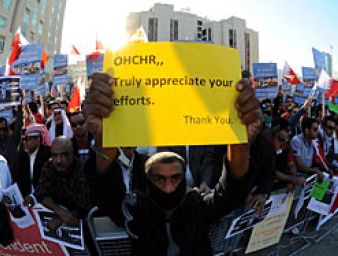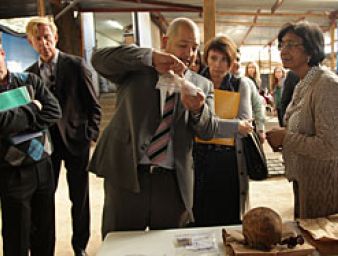A World without Arbitrary Detention
12 December 2011

“If people are placed under arbitrary detention for exercising their right to a free conscience, then we diminish the value of the whole world. We diminish the value of thinking human beings.” Aung San Suu Kyi, a Myanmar pro-democracy leader and Nobel Peace laureate, made these remarks in a video statement at a special event in Paris commemorating the 20th anniversary of the United Nations Working Group on Arbitrary Detention. Suu Kyi, who is the subject of six opinions by the Working Group, was a victim of arbitrary detention for more than 15 years.
Thousands of people every year are illegally detained in countries around the world and some of these individual cases have been submitted to the Working Group for consideration. The Working Group then makes its decision and adopts an opinion on whether an individual has been detained arbitrarily or not.
“We would like to thank the Working Group for all that it has done for all political prisoners in Burma, of whom I was one until last year,” Suu Kyi said.
High-profile cases considered by the Working Group include Aung San Suu Kyi, the Prime Minister of East Timor Xanana Gusmao, Iranian cartoonist Manouchehr Karimzadeh, Judge Lourdes Afiuni Mora of Venezuela, opposition party leader Birtukan Mideksa of Ethiopia, and Syrian human rights activist and former judge Haitham al-Maleh.
“The mandate of the Working Group has never been as relevant and necessary as it is in today’s world,” Bacre Ndiaye, Director of the Human Rights Council and Special Procedures Division of the United Nations Human Rights office, said in his keynote speech to the gathering that included high-profile survivors of arbitrary detention, as well as members and former members from the WGAD, NGOs, government officials, and human rights activists.
“Arbitrary detention has become endemic and is more and more, in the context of recent protests around the world, used as a weapon to silence and eliminate all opposition,” he said.
To commemorate its two decades of work, the Group has compiled the documentation describing many of its cases to be used in reporting, investigating and campaigning for the rights of people held in arbitrary detention. The free online database contains country visit reports, annual reports, and individual case studies with more than 600 individual opinions from the WGAD. The database is available to the public in Spanish, French, and English.
Ndiaye acknowledged the importance of the practices set by the Group: “The opinions of the Working Group have also been used to mobilize civil society organizations and initiate events that have subsequently led to the release of individuals who have been arbitrarily detained,” he said.
El Hadji Malick Sow, Chair-Rapporteur of the Working Group, said that the database is a vital tool for people everywhere. “All countries are confronted by the practice of arbitrary detention,” Sow said. “It knows no boundaries and thousands are subjected to it every year either because they have exercised their fundamental rights, or because they have been unable to benefit from the guarantees of a fair trial, or for other reasons like the growing practice of administrative detention for asylum seekers,” he said.
Louis Joinet, founding member and first Chair-Rapporteur of the Working Group on Arbitrary Detention, said that the Working Group was created to bring attention to arbitrary detention and ultimately end the practice.
“There have been many prisoners of conscience in Burma for over 23 years,” Suu Kyi said. “Some have been released, but still many remain in prison—not just in Burma, but in other countries all over the world. People have been detained for their beliefs,” she added.

VIEW THIS PAGE IN:



